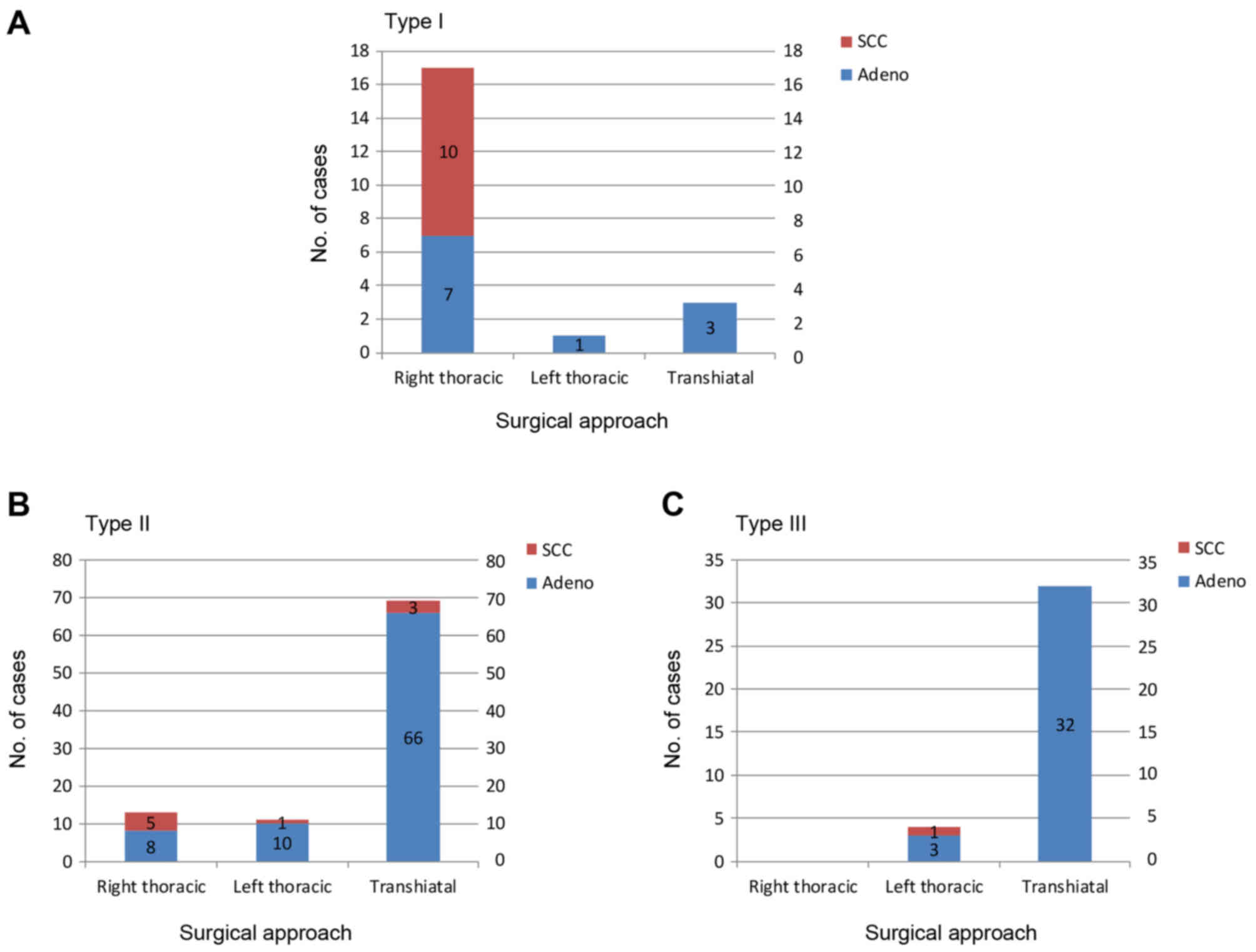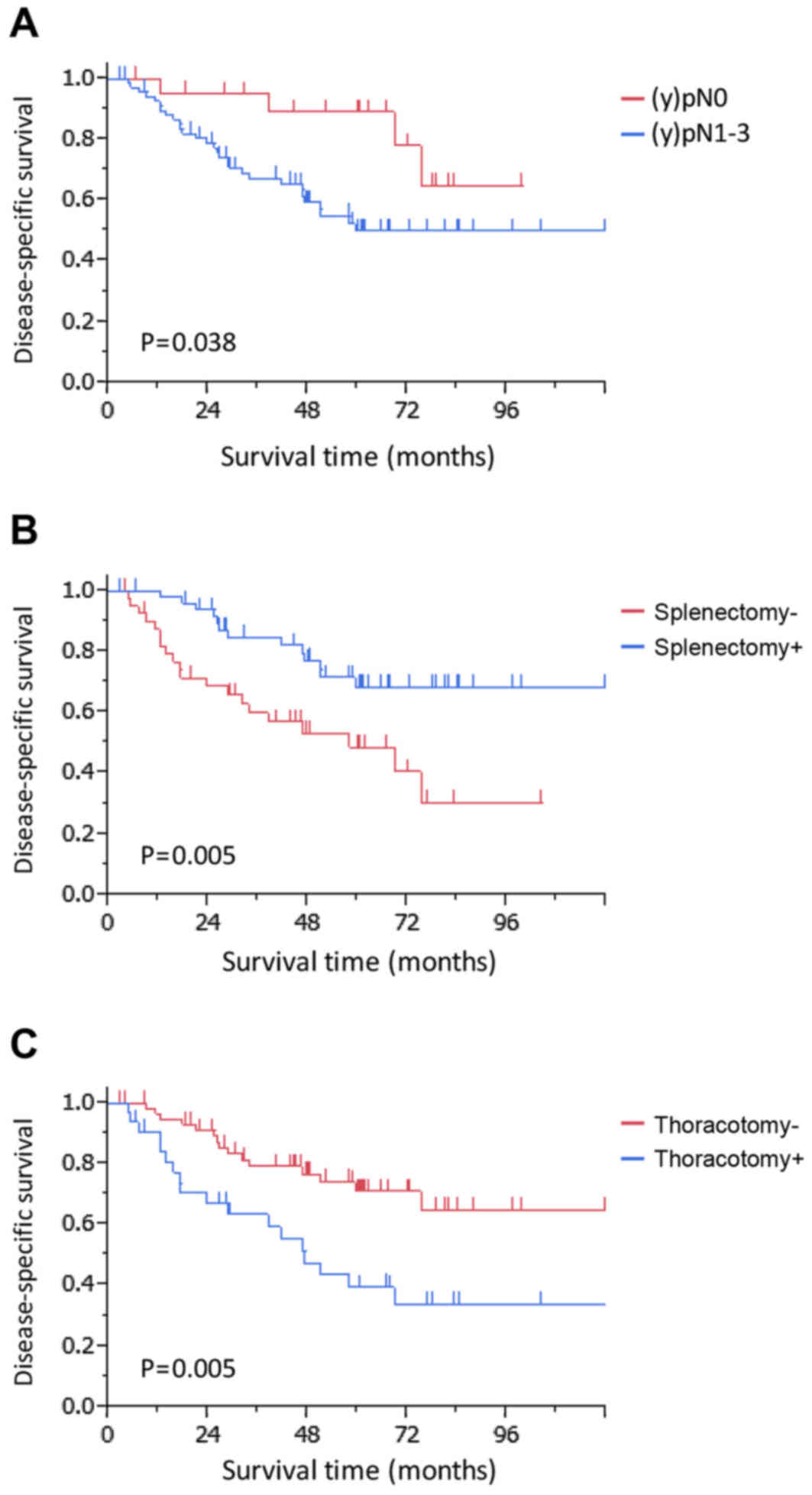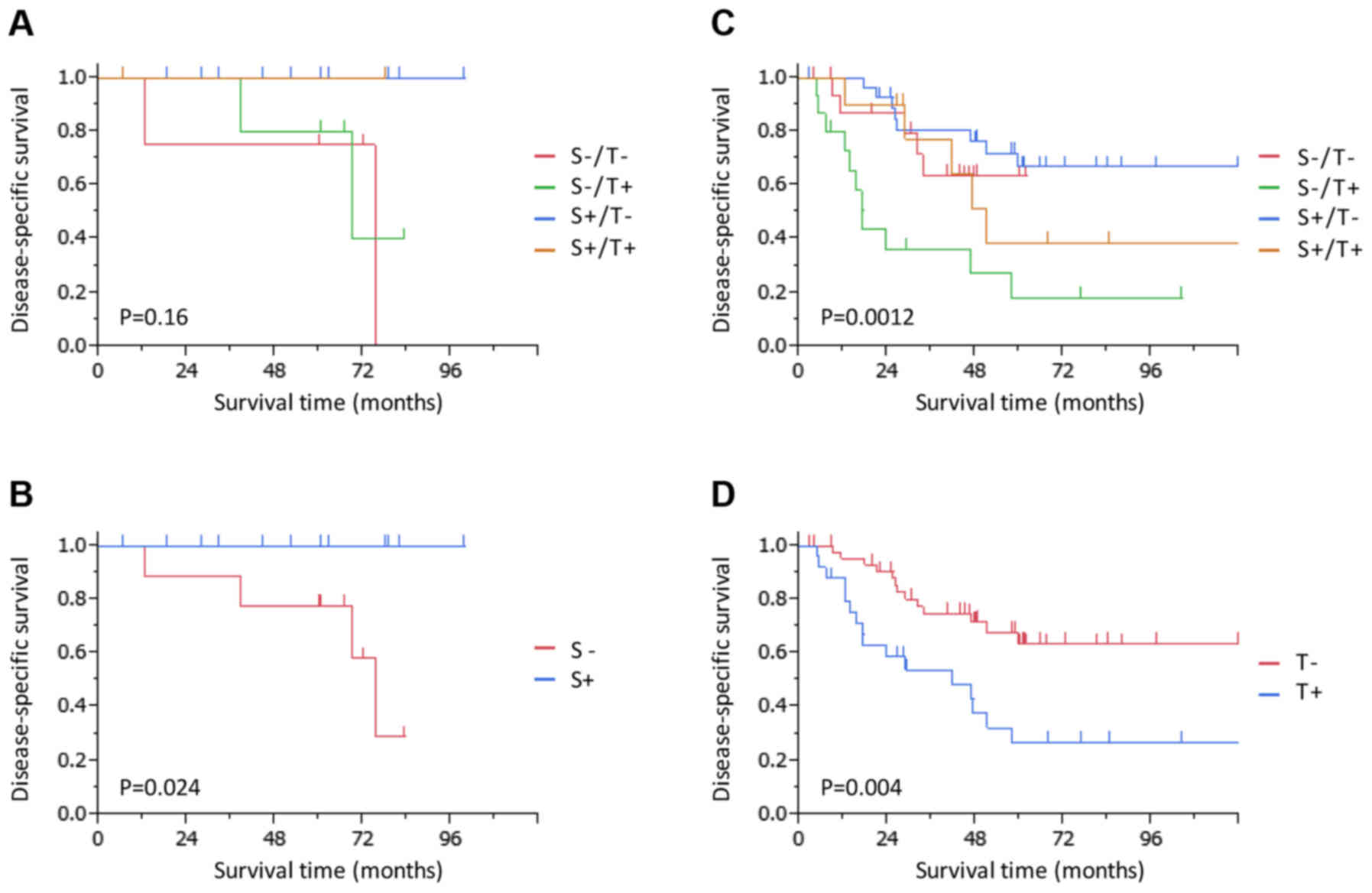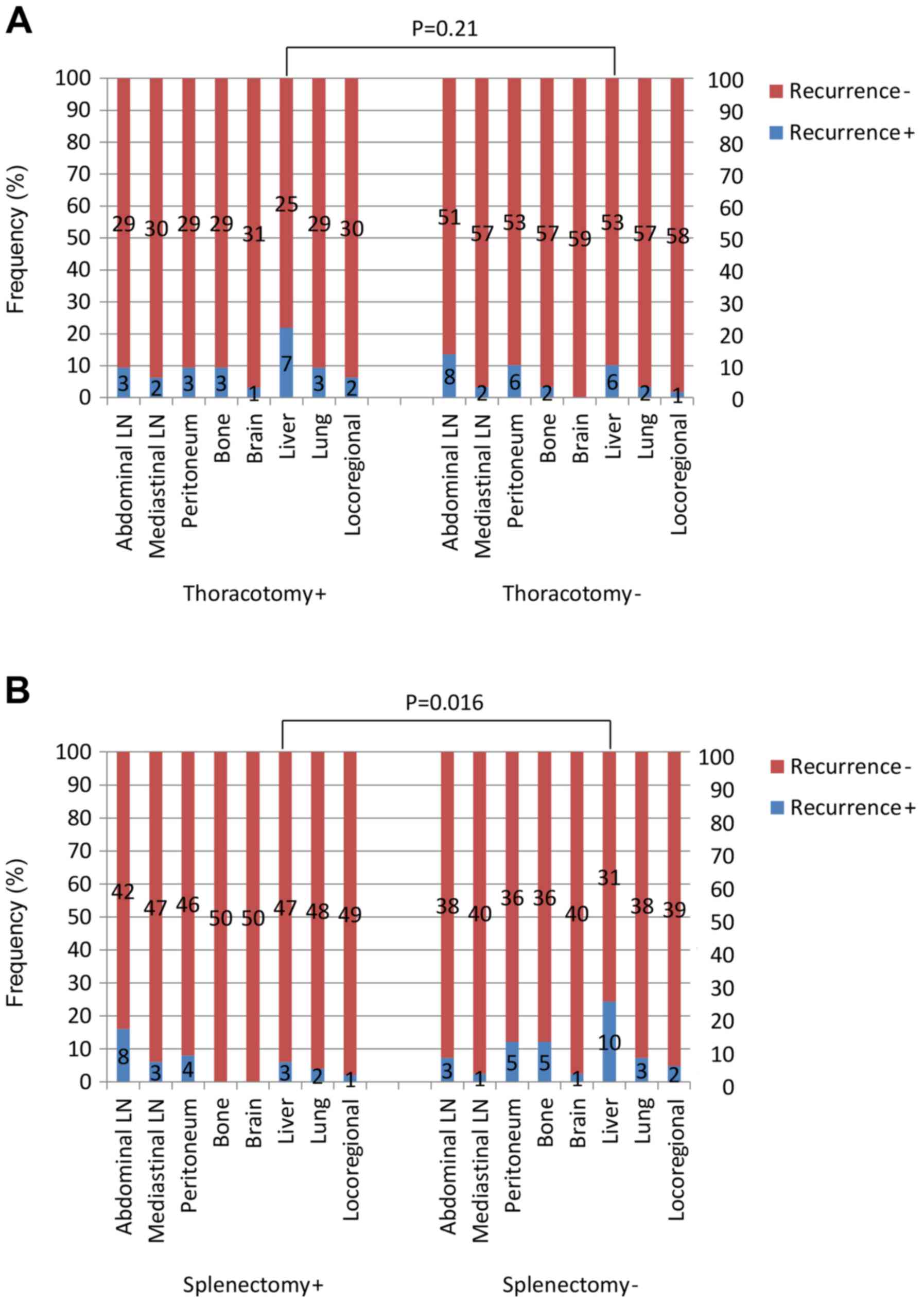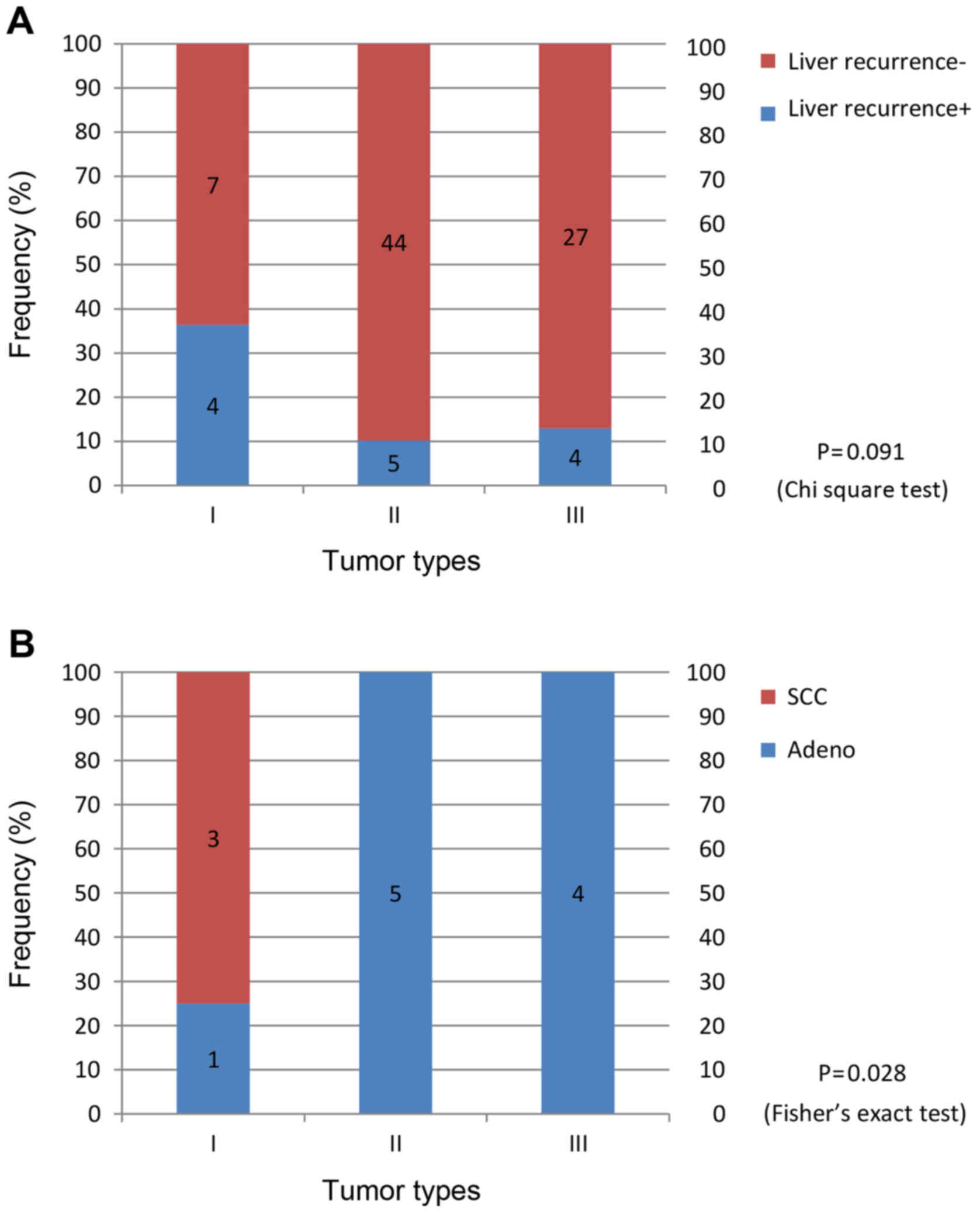|
1
|
Devesa SS, Blot WJ and Fraumeni JF Jr:
Changing patterns in the incidence of esophageal and gastric
carcinoma in the United States. Cancer. 83:2049–2053. 1998.
View Article : Google Scholar : PubMed/NCBI
|
|
2
|
Pohl H and Welch HG: The role of
overdiagnosis and reclassification in the marked increase of
esophageal adenocarcinoma incidence. J Natl Cancer Inst.
97:142–146. 2005. View Article : Google Scholar : PubMed/NCBI
|
|
3
|
Kusano C, Gotoda T, Khor CJ, Katai H, Kato
H, Taniguchi H and Shimoda T: Changing trends in the proportion of
adenocarcinoma of the esophagogastric junction in a large tertiary
referral center in Japan. J Gastroenterol Hepatol. 23:1662–1665.
2008. View Article : Google Scholar : PubMed/NCBI
|
|
4
|
Blaser MJ and Saito D: Trends in reported
adenocarcinomas of the oesophagus and gastric cardia in Japan. Eur
J Gastroenterol Hepatol. 14:107–113. 2002. View Article : Google Scholar : PubMed/NCBI
|
|
5
|
Yamashita K, Sakuramoto S, Nemoto M,
Shibata T, Mieno H, Katada N, Kikuchi S and Watanabe M: Trend in
gastric cancer: 35 years of surgical experience in Japan. World J
Gastroenterol. 17:3390–3397. 2011. View Article : Google Scholar : PubMed/NCBI
|
|
6
|
Rüdiger Siewert J, Feith M, Werner M and
Stein HJ: Adenocarcinoma of the esophagogastric junction: Results
of surgical therapy based on anatomical/topographic classification
in 1,002 consecutive patients. Ann Surg. 232:353–361. 2000.
View Article : Google Scholar : PubMed/NCBI
|
|
7
|
Barbour AP, Rizk NP, Gonen M, Tang L,
Bains MS, Rusch VW, Coit DG and Brennan MF: Adenocarcinoma of the
gastroesophageal junction: Influence of esophageal resection margin
and operative approach on outcome. Ann Surg. 246:1–8. 2007.
View Article : Google Scholar : PubMed/NCBI
|
|
8
|
Sasako M, Sano T, Yamamoto S, Sairenji M,
Arai K, Kinoshita T, Nashimoto A and Hiratsuka M; Japan Clinical
Oncology Group (JCOG9502), : Left thoracoabdominal approach versus
abdominal-transhiatal approach for gastric cancer of the cardia or
subcardia: A randomised controlled trial. Lancet Oncol. 7:644–651.
2006. View Article : Google Scholar : PubMed/NCBI
|
|
9
|
van Hagen P, Hulshof MC, van Lanschot JJ,
Steyerberg EW, van Berge Henegouwen MI, Wijnhoven BP, Richel DJ,
Nieuwenhuijzen GA, Hospers GA, Bonenkamp JJ, et al: Preoperative
chemoradiotherapy for esophageal or junctional cancer. N Engl J
Med. 366:2074–2084. 2012. View Article : Google Scholar : PubMed/NCBI
|
|
10
|
Zanoni A, Verlato G, Giacopuzzi S,
Weindelmayer J, Casella F, Pasini F, Zhao E and de Manzoni G:
Neoadjuvant concurrent chemoradiotherapy for locally advanced
esophageal cancer in a single high-volume center. Ann Surg Oncol.
20:1993–1999. 2013. View Article : Google Scholar : PubMed/NCBI
|
|
11
|
Tepper J, Krasna MJ, Niedzwiecki D, Hollis
D, Reed CE, Goldberg R, Kiel K, Willett C, Sugarbaker D and Mayer
R: Phase III trial of trimodality therapy with cisplatin,
fluorouracil, radiotherapy, and surgery compared with surgery alone
for esophageal cancer: CALGB 9781. J Clin Oncol. 26:1086–1092.
2008. View Article : Google Scholar : PubMed/NCBI
|
|
12
|
Ando N, Iizuka T, Ide H, Ishida K, Shinoda
M, Nishimaki T, Takiyama W, Watanabe H, Isono K, Aoyama N, et al:
Surgery plus chemotherapy compared with surgery alone for localized
squamous cell carcinoma of the thoracic esophagus: A Japan Clinical
Oncology Group Study-JCOG9204. J Clin Oncol. 21:4592–4596. 2003.
View Article : Google Scholar : PubMed/NCBI
|
|
13
|
Ando N, Kato H, Igaki H, Shinoda M, Ozawa
S, Shimizu H, Nakamura T, Yabusaki H, Aoyama N, Kurita A, et al: A
randomized trial comparing postoperative adjuvant chemotherapy with
cisplatin and 5-fluorouracil versus preoperative chemotherapy for
localized advanced squamous cell carcinoma of the thoracic
esophagus (JCOG9907). Ann Surg Oncol. 19:68–74. 2012. View Article : Google Scholar : PubMed/NCBI
|
|
14
|
Sobin LH and Wittekind C: TNM
Classification of Malignant Tumours. 7th. Wiley-Blackwell; New
York, NY: 2009
|
|
15
|
Weitz J, D'Angelica M, Gonen M, Klimstra
D, Coit DG, Brennan MF and Karpeh MS: Interaction of splenectomy
and perioperative blood transfusions on prognosis of patients with
proximal gastric and gastroesophageal junction cancer. J Clin
Oncol. 21:4597–4603. 2003. View Article : Google Scholar : PubMed/NCBI
|
|
16
|
Dindo D, Demartines N and Clavien PA:
Classification of surgical complications: A new proposal with
evaluation in a cohort of 6336 patients and results of a survey.
Ann Surg. 240:205–213. 2004. View Article : Google Scholar : PubMed/NCBI
|
|
17
|
Clavien PA, Barkun J, de Oliveira ML,
Vauthey JN, Dindo D, Schulick RD, de Santibanes E, Pekolj J,
Slankamenac K, Bassi C, et al: The Clavien-Dindo classification of
surgical complications: Five-year experience. Ann Surg.
250:187–196. 2009. View Article : Google Scholar : PubMed/NCBI
|
|
18
|
Koizumi W, Nakayama N, Tanabe S, Sasaki T,
Higuchi K, Nishimura K, Takagi S, Azuma M, Ae T, Ishido K, et al: A
multicenter phase II study of combined chemotherapy with docetaxel,
cisplatin, and S-1 in patients with unresectable or recurrent
gastric cancer (KDOG 0601). Cancer Chemother Pharmacol. 69:407–413.
2012. View Article : Google Scholar : PubMed/NCBI
|
|
19
|
Koizumi W, Narahara H, Hara T, Takagane A,
Akiya T, Takagi M, Miyashita K, Nishizaki T, Kobayashi O, Takiyama
W, et al: S-1 plus cisplatin versus S-1 alone for first-line
treatment of advanced gastric cancer (SPIRITS trial): a phase III
trial. Lancet Oncol. 9:215–221. 2008. View Article : Google Scholar : PubMed/NCBI
|
|
20
|
Sakuramoto S, Sasako M, Yamaguchi T,
Kinoshita T, Fujii M, Nashimoto A, Furukawa H, Nakajima T, Ohashi
Y, Imamura H, et al: Adjuvant chemotherapy for gastric cancer with
S-1, an oral fluoropyrimidine. N Engl J Med. 357:1810–1820. 2007.
View Article : Google Scholar : PubMed/NCBI
|
|
21
|
Sasako M, Sakuramoto S, Katai H, Kinoshita
T, Furukawa H, Yamaguchi T, Nashimoto A, Fujii M, Nakajima T and
Ohashi Y: Five-year outcomes of a randomized phase III trial
comparing adjuvant chemotherapy with S-1 versus surgery alone in
stage II or III gastric cancer. J Clin Oncol. 29:4387–4393. 2011.
View Article : Google Scholar : PubMed/NCBI
|
|
22
|
Kaplan EL and Meier P: Nonparametric
estimation from incomplete observations. J Am Stat Assoc.
53:457–481. 1958. View Article : Google Scholar
|
|
23
|
Ng CS, Wan IY and Yim AP: Impact of
video-assisted thoracoscopic major lung resection on immune
function. Asian Cardiovasc Thorac Ann. 17:426–432. 2009. View Article : Google Scholar : PubMed/NCBI
|
|
24
|
Hirai T, Matsumoto H, Yamashita K, Urakami
A, Iki K, Yamamura M and Tsunoda T: Surgical oncotaxis-excessive
surgical stress and postoperative complications contribute to
enhancing tumor metastasis, resulting in a poor prognosis for
cancer patients. Ann Thorac Cardiovasc Surg. 11:4–6.
2005.PubMed/NCBI
|
|
25
|
Goto H, Tokunaga M, Sugisawa N, Tanizawa
Y, Bando E, Kawamura T, Niihara M, Tsubosa Y and Terashima M: Value
of splenectomy in patients with Siewert type II adenocarcinoma of
the esophagogastric junction. Gastric Cancer. 16:590–595. 2013.
View Article : Google Scholar : PubMed/NCBI
|
|
26
|
Huang CM, Wang JB, Lu HS, Zheng CH, Li P,
Xie JW and Zhang XF: Prognostic impact of splenectomy on advanced
proximal gastric cancer with No. 10 lymph node metastasis. Chin Med
J (Engl). 122:2757–2762. 2009.PubMed/NCBI
|
|
27
|
Shiratori Y, Kawase T, Nakata R, Tanaka M,
Hikiba Y, Okano K, Matsumura M, Niwa Y, Komatsu Y, Shiina S, et al:
Effect of splenectomy on hepatic metastasis of colon carcinoma and
natural killer activity in the liver. Dig Dis Sci. 40:2398–2406.
1995. View Article : Google Scholar : PubMed/NCBI
|
|
28
|
Higashijima J, Shimada M, Chikakiyo M,
Miyatani T, Yoshikawa K, Nishioka M, Iwata T and Kurita N: Effect
of splenectomy on antitumor immune system in mice. Anticancer Res.
29:385–393. 2009.PubMed/NCBI
|
|
29
|
Sonoda K, Izumi K, Matsui Y, Inomata M,
Shiraishi N and Kitano S: Decreased growth rate of lung metastatic
lesions after splenectomy in mice. Eur Surg Res. 38:469–475. 2006.
View Article : Google Scholar : PubMed/NCBI
|
|
30
|
Wayman J, Bennett MK, Raimes SA and
Griffin SM: The pattern of recurrence of adenocarcinoma of the
oesophago-gastric junction. Br J Cancer. 86:1223–1229. 2002.
View Article : Google Scholar : PubMed/NCBI
|
|
31
|
Yamashita H, Katai H, Morita S, Saka M,
Taniguchi H and Fukagawa T: Optimal extent of lymph node dissection
for Siewert type II esophagogastric junction carcinoma. Ann Surg.
254:274–280. 2011. View Article : Google Scholar : PubMed/NCBI
|
|
32
|
Lee J, Lim DH, Kim S, Park SH, Park JO,
Park YS, Lim HY, Choi MG, Sohn TS, Noh JH, et al: Phase III trial
comparing capecitabine plus cisplatin versus capecitabine plus
cisplatin with concurrent capecitabine radiotherapy in completely
resected gastric cancer with D2 lymph node dissection: The ARTIST
trial. J Clin Oncol. 30:268–273. 2012. View Article : Google Scholar : PubMed/NCBI
|
|
33
|
Takahashi H, Arimura Y, Yamashita K,
Okahara S, Tanuma T, Kodaira J, Hokari K, Tsukagoshi H, Shinomura Y
and Hosokawa M: Phase I/II study of
docetaxel/cisplatin/fluorouracil combination chemotherapy against
metastatic esophageal squamous cell carcinoma. J Thorac Oncol.
5:122–128. 2010. View Article : Google Scholar : PubMed/NCBI
|
|
34
|
Yamasaki M, Miyata H, Tanaka K, Shiraishi
O, Motoori M, Peng YF, Yasuda T, Yano M, Shiozaki H, Mori M, et al:
Multicenter phase I/II study of docetaxel, cisplatin and
fluorouracil combination chemotherapy in patients with advanced or
recurrent squamous cell carcinoma of the esophagus. Oncology.
80:307–313. 2011. View Article : Google Scholar : PubMed/NCBI
|
|
35
|
Ui T, Fujii H, Hosoya Y, Nagase M, Mieno
MN, Mori M, Zuiki T, Saito S, Kurashina K, Haruta H, et al:
Comparison of preoperative chemotherapy using docetaxel, cisplatin
and fluorouracil with cisplatin and fluorouracil in patients with
advanced carcinoma of the thoracic esophagus. Dis Esophagus.
28:180–187. 2015. View Article : Google Scholar : PubMed/NCBI
|
|
36
|
Korst RJ, Kansler AL, Port JL, Lee PC,
Kerem Y and Altorki NK: Downstaging of T or N predicts long-term
survival after preoperative chemotherapy and radical resection for
esophageal carcinoma. Ann Thorac Surg. 82:480–485. 2006. View Article : Google Scholar : PubMed/NCBI
|
|
37
|
Noble F, Nolan L, Bateman AC, Byrne JP,
Kelly JJ, Bailey IS, Sharland DM, Rees CN, Iveson TJ, Underwood TJ,
et al: Refining pathological evaluation of neoadjuvant therapy for
adenocarcinoma of the esophagus. World J Gastroenterol.
19:9282–9293. 2013. View Article : Google Scholar : PubMed/NCBI
|















